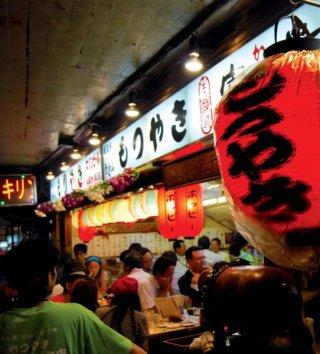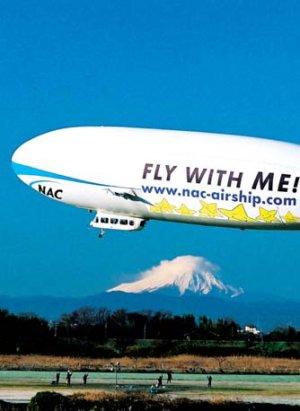Salaryman-Style: Fried Chicken and Sushi
 A business staple of Japan, the Yurakucho nightspot in Tokyo is a salaryman’s entertainment hot spot.
A business staple of Japan, the Yurakucho nightspot in Tokyo is a salaryman’s entertainment hot spot.
By Hugh Ashton
The lack of legroom for wining and dining has some companies looking for alternatives.
Anyone who has had extended connections with Japanese companies will recognize the following scenario: turn up at a Tokyo hotel at about 6.30 p.m., in company with a few hundred dark-suited male middle managers, and listen to speeches delivered by several hosting executives standing in front of a banner declaring the purpose of the gathering. After 20 minutes of this, bottles of beer are opened, the magic word “Kanpai!” is shouted, and the hordes attack the fried chicken and sushi provided as a buffet. At a precisely defined hour, usually quite early, the hotel staff stop refilling glasses and start politely but firmly ushering the guests to the door, where coats are collected and trains caught back to the suburbs.
Such is the traditional face of mass corporate entertainment in Japan, but according to Patricia Elleven of Fireworks Inc., who specialize in what is termed in the trade as “experiential marketing,” and the rest of us know as “corporate events,” this is changing.
“Not only do Japanese companies see foreign companies here in Japan adopting more adventurous event marketing strategies, including the provision of entertainment, but their own management return from overseas assignments and ask ‘why can’t we do things like we saw being done overseas?” she explains. However, she says there are many obstacles to overcome, and location, being a primary element of any event, is the first hurdle to be leapt. In Tokyo, outside the circuit of the major hotels’ large banquet/entertainment spaces and some larger event facilities, there are really very few places where it is possible to entertain a few hundred people for an extended event and theme it appropriately. Hotels are often wary of attempts to “brand” an event, says Elleven, quoting one such occasion some years ago where clear plastic tubes filled with backlit bubbling water were to be placed around the floor, much to the horror of the hotel, who eventually allowed their placement. Elleven says that even tents for such occasions must conform to building, rather than temporary structure codes.
Prime Tokyo hotel space is limited, complains a corporate communications executive at a foreign company in Tokyo. “If I was asked in August to organize an event for a few hundred people before Christmas, I could probably get it done, but it would probably end up being a Monday afternoon at 3pm, and we’d have to be out of there at 5pm sharp.” Although it is possible to privately rent an area of Tokyo’s Disneyland for an hour or so, Disney rules and regulations apply (for example, no event “uniforms” such as caps or happi coats are allowed). In addition, travel outside the Tokyo metropolitan district is subject to unknown variables, and can seriously disrupt event schedules.
Even if such a non-hotel space is available, Elleven continues, there is a lack of suitable catering and other support facilities (lighting, power) for these events. The choice of entertainment, so much a part of corporate events in the USA is also sadly limited. “In other countries,” she points out, “there is often a whole ‘minor league’ of great talent, ranging from Cirque de Soleil-type acts and dancers through to highly polished corporate dance bands. The salaryman culture in Japan militates against dancing at corporate events, and as wives are not invited, there’s been no demand for these acts. There are excellent jazz and classical music performers here in Tokyo, but apart from that...” she shrugs. “Sometimes it’s more cost-effective to bring in talent from Australia or the USA than it is to use home-grown talent—anyone with a name here costs serious money. But things are changing and there is more ‘mainstream’ entertainment outside the quirky nightlife scene available now than when I started 15 years ago.” She adds that early planning when importing talent is essential in order to avoid potential visa-related problems.
Of course, at extended conferences with visitors to Japan, a look at traditional Japanese culture is often seen as a “must.” A little Noh goes a long way for most people, even with the linguistic and cultural barriers. Recently though, a greater number of traditional performers are now reducing the length of their acts, or incorporating Western cross-over elements into their art—something that would have been unthinkable 20 years ago. Hip-hop kabuki, anyone? Black-water Projects, based in Ireland and Japan, specializes in providing introductions to traditional Japanese culture, such as geisha parties, for events organized by both foreign and Japanese companies, as well as introducing Irish culture to Japanese clients.
Visits to traditional Japanese locations (Kyoto, for example) are also part of many extended events’ agenda, but organizers often find it more appropriate to organize their own itineraries for these tours than adopt the stock packages from Japanese travel companies.
Private Entertainment
Corporate entertainment on an individual basis is a somewhat secretive area. Wealth management companies will not want to hold a mass event for a group of multi-millionaires, but will build up relationships based on the preferences of the individuals concerned. For example, a personalized all-expenses-paid weekend to Malaysia to watch the Grand Prix in a hospitality suite would go down well with F1 fans.
 The Zeppelin airship—the future of corporate entertainment in Japan?
The Zeppelin airship—the future of corporate entertainment in Japan?
But for sporting events in Japan, there seems to be a serious lack of the luxury hospitality facilities that grace European and American sporting venues, with only a minority of baseball stadiums, such as Chiba Marine Stadium (Chiba Lotte Marines), and the Tokyo Dome (Yomiuri Giants) including party spaces bookable by groups. However, this lack of private facilities means “that you cannot capture the moment at the event with finesse and sophistication and build up your relationship with your clients,” according to one foreign finance executive, who sees it as one of the primary reasons for booking space at such an event.
On another level, the Zeppelin NT airship operated by Nippon Airship Company (NAC), has become a familiar sight in the skies over Japan, and companies or individuals may book passenger flights on this unique aircraft. Makoto Aoki of NAC told J@pan Inc that a major credit card company had taken the initiative by offering a luxury weekend, including flights in the airship, to eight lucky winners of a prize draw.
However, the idea of providing such trips for high-flying customers does not yet seem to have gained popularity within the Japanese corporate world, a possible gap in the market for Aoki to benefit from.
But for the most part, it seems that Japanese corporate entertainment hasn’t changed much from 20 years ago—golf for the most important customers, and restaurants and hostess bars of different levels of sophistication for the rest. JI
1988 Corporate Entertainment (height of the bubble era)
Sake with gold leaves 1,800ml: 16,590 yen
Golf club membership: 6,200,000 yen
One night stay at a luxury onsen:157,500 yen
Hostess Club: one sitting plus a bottle of wine/champagne: 600,000 yen
Karaoke: banquet room only for 30 minutes, (excluding drinks):17,500 yen
Total: 6,991,590 yen
2008 Corporate Entertainment (credit crunch)
Kirin Premium beer rich taste 330ml: 238 yen
Cosplay shabu-shabu: 80 minutes all-you-can-eat-and-drink: 5,789 yen
Izakaya-taxi (taxis that serve politicians and businessmen snacks and alcohol inside the taxi): 15,000 ~ 20,000 yen
Hostess club Ginza: 50,000 yen per person
Top-end wine at said establishment: 300,000 yen per bottle
Total: 376,027 yen





